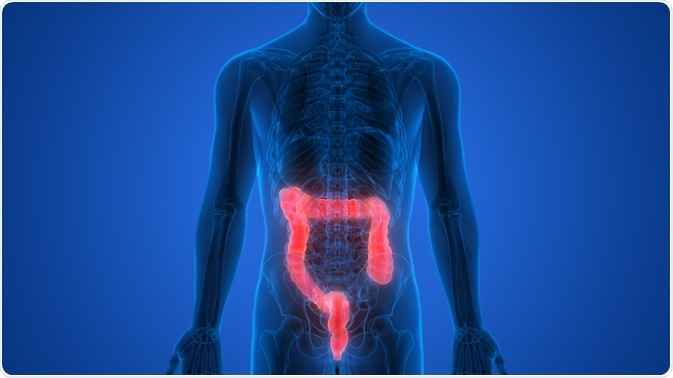.jpg) By Chloe Bennett, B.Sc.
By Chloe Bennett, B.Sc.What is the large intestine?
The large intestine is part of the alimentary canal, which responsible for absorbing water from indigestible food. Measuring approximately six feet long, the large intestine is made up of four main parts: the cecum, the colon, the rectum, and the anus. Compared to the small intestine, the large intestine measures shorter in length, has a larger sized lumen, and does not contain villi – small hair-like projections.
 Image Credit: Magic mine / Shutterstock.com
Image Credit: Magic mine / Shutterstock.com
Function of the large intestine
The large intestine is considered to have a number of functions, including the absorption of electrolytes, vitamins, and water from waste substances alongside the formation and elimination of feces.
Formation and elimination of feces
After the consumption of food, the small intestine firstly absorbs approximately 90% of ingested water, leaving the large intestine to absorb any remaining water. This process involves the conversion of liquid chyme residue into feces. Feces or stools are comprised of indigestible food, bacteria, inorganic salts, unabsorbed substances, and epithelial cells, in addition to sufficient water for it to pass out of the body.
Contractions of the rectal muscles help to remove the feces from the body. This mechanism is assisted by the contraction of the abdominal walls and diaphragm, increasing intra-abdominal pressure, resulting in the closure of the glottis.
Absorption of vitamins
The large intestine absorbs vitamins produced by its own bacteria, referred to as commensal bacteria. Research suggests that there are over 700 types of bacteria that vary in function, but all provide gut health benefits.
The role of commensal bacteria is to breakdown remaining fiber and polysaccharides and convert them into short-chain fatty acids, which are then absorbed via diffusion by the large intestine. Additionally, the bacteria create gas comprised of a mixture of carbon dioxide, nitrogen, methane, hydrogen sulfide, and hydrogen caused by the fermentation of the polysaccharides.
The bacteria produce vitamin B and K in addition to biotin through fermentation. If the dietary intake of these vitamins is low, then this source of vitamins can be vital. However, if over-dependent on this source, then individuals may become deficient if they take antibiotics that kill the bacteria.
Absorption of water and electrolytes
Water is absorbed by the large intestine by osmosis, with diffusion occurring in accordance with the osmotic gradient.
Sodium is absorbed by the sodium/potassium pump in the colon, which diffuses potassium and sodium in opposite directions due to the formation of concentration gradients. Potassium secreted due to the release of aldosterone and bicarbonate ions is swapped for chloride ions across the concentration gradient.
Antibody production
The large intestine hosts many lymphoid tissues, which are vital for immunity. They assist with the creation of antibodies that act against the commensal bacteria but may be useful in acting against harmful bacteria, preventing infections.
Acid reduction
The large intestine’s mucosa produces bicarbonates which neutralize acidity caused by the synthesis of fatty acids. Furthermore, the large intestines’ mucosal layer acts as a barrier, protecting against microbial infections.
Disorders of the large intestine
There are several disorders of the large intestine which range in severity and in terms of permanence.
Coeliac disease
Those with coeliac disease are described to be intolerant to gluten. If eaten, the large intestines’ T cells release inflammatory mediators, which reduce the ability to absorb and digest consumed food. Those with the condition may report bloating, constipation, or diarrhea or abdominal pain during a flare-up.
Constipation
Constipation can be caused due to reduced mobility and a diet characterized as being low in fiber. Those who are constipated experience difficult, painful, or infrequent eliminate of feces caused by the feces being dry or hard. This condition can also be caused due to dehydration and by the consumption of certain medications.
Diarrhea
Diarrhea is typically caused by food poisoning, norovirus, or gastroenteritis, as well as due to preexisting conditions such as inflammatory bowel disease or intolerances. The condition is characterized by watery or loose stools, and if lost fluids are not replenished, it can cause dehydration.
Lactose intolerance
Those with lactose intolerance are unable to digest lactose found in food and drink properly. As the lactose cannot be digested, it begins to ferment in the large intestine, causing diarrhea, gas, bloating, and cramps.
Sources
- The Small and Large Intestines: https://opentextbc.ca/
- Azzouz, L. L., & Sharman, S. (2019). Physiology, Large Intestine. StatPearls. https://www.ncbi.nlm.nih.gov/books/NBK507857/
- Nursing Times (2019). Gastrointestinal tract 5: the anatomy and function of the large intestine. Gastroenterology. www.nursingtimes.net/.../#Also_in_this_series
- Kooji, I. A., Sahami, S., Meijer, S. L., Buskens, C. J., & Velde, A. A. (2016). The immunology of the vermiform appendix: a review of the literature. Clinical & Experimental Immunology. DOI: 10.1111/cei.12821
- Kahai, P., Mandiga, P., & Lobo, S. (2019). Anatomy, Abdomen and Pelvis, Large Intestine. StatPearls. https://www.ncbi.nlm.nih.gov/books/NBK470577/
Further Reading
Last Updated: Dec 2, 2022